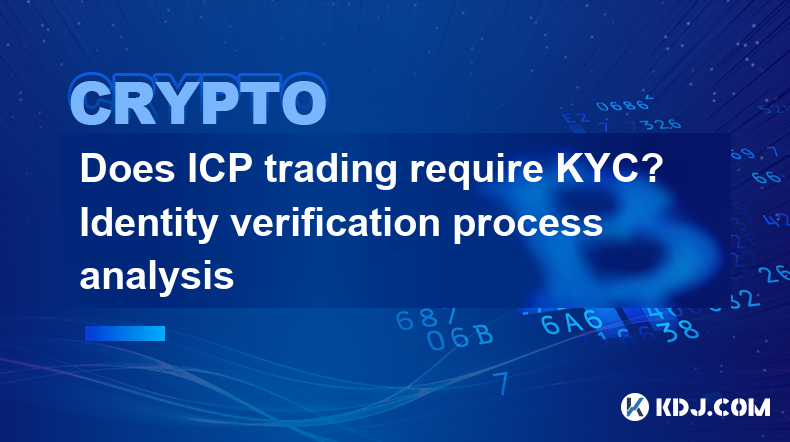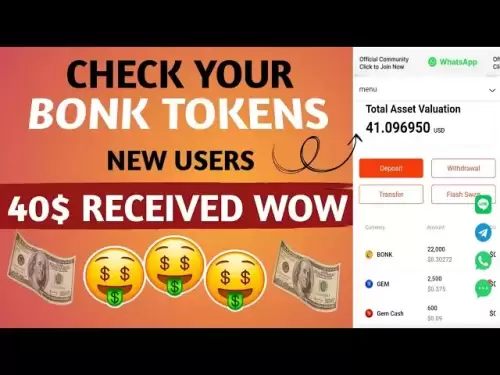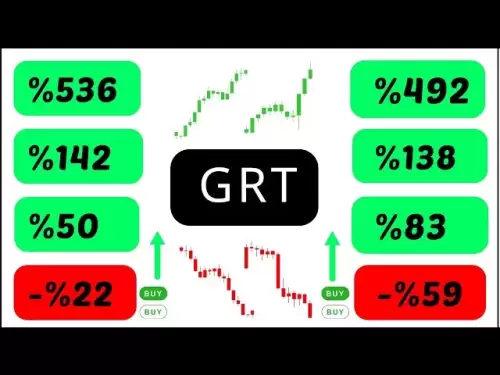-
 Bitcoin
Bitcoin $107,735.6569
1.76% -
 Ethereum
Ethereum $2,430.3849
-0.49% -
 Tether USDt
Tether USDt $1.0004
-0.02% -
 XRP
XRP $2.1999
-0.26% -
 BNB
BNB $647.6206
0.63% -
 Solana
Solana $144.6359
0.33% -
 USDC
USDC $0.9999
-0.02% -
 TRON
TRON $0.2728
-0.64% -
 Dogecoin
Dogecoin $0.1658
0.84% -
 Cardano
Cardano $0.5714
-2.17% -
 Hyperliquid
Hyperliquid $37.2174
0.11% -
 Bitcoin Cash
Bitcoin Cash $488.5114
7.12% -
 Sui
Sui $2.7756
0.31% -
 Chainlink
Chainlink $13.2168
-1.08% -
 UNUS SED LEO
UNUS SED LEO $9.0103
0.56% -
 Stellar
Stellar $0.2431
-1.96% -
 Avalanche
Avalanche $17.7244
-2.02% -
 Toncoin
Toncoin $2.8513
-0.93% -
 Shiba Inu
Shiba Inu $0.0...01166
0.72% -
 Litecoin
Litecoin $84.9034
-0.09% -
 Hedera
Hedera $0.1511
-2.46% -
 Monero
Monero $312.5351
-1.26% -
 Ethena USDe
Ethena USDe $1.0003
-0.03% -
 Polkadot
Polkadot $3.3981
-1.34% -
 Dai
Dai $0.9999
0.00% -
 Bitget Token
Bitget Token $4.3340
1.02% -
 Pi
Pi $0.6230
15.55% -
 Uniswap
Uniswap $7.0009
-1.17% -
 Pepe
Pepe $0.0...09665
-2.06% -
 Aave
Aave $258.0491
-3.06%
Does ICP trading require KYC? Identity verification process analysis
KYC requirements for trading ICP vary by platform; centralized exchanges like Binance and Coinbase mandate it, while DEXs like Uniswap often do not.
May 06, 2025 at 03:15 pm

The question of whether trading Internet Computer (ICP) tokens requires Know Your Customer (KYC) procedures is a common one among cryptocurrency enthusiasts. The answer to this question can vary depending on the platform or exchange used for trading ICP. In this article, we will delve into the intricacies of KYC requirements for ICP trading, analyze the identity verification process, and discuss how different exchanges handle these requirements.
Understanding KYC and Its Importance in Cryptocurrency Trading
KYC, or Know Your Customer, is a process by which businesses verify the identity of their clients. In the realm of cryptocurrency, KYC is crucial for several reasons. It helps prevent fraud, money laundering, and other illicit activities by ensuring that users are who they claim to be. Regulatory bodies around the world have increasingly mandated KYC compliance for cryptocurrency exchanges to operate legally.
When it comes to trading ICP, the necessity of KYC depends largely on the platform you choose. Some decentralized exchanges (DEXs) may not require KYC, while centralized exchanges (CEXs) almost always do. Understanding the distinction between these types of platforms is essential for any trader looking to engage with ICP.
KYC Requirements on Centralized Exchanges for ICP Trading
Centralized exchanges are the most common platforms for trading cryptocurrencies, including ICP. These platforms typically require users to complete a KYC process before they can trade. The KYC process on centralized exchanges for ICP trading involves several steps:
- Registration: Users must first create an account on the exchange by providing basic information such as an email address and password.
- Basic Verification: This step usually requires users to submit personal information such as their full name, date of birth, and address. Some exchanges may also ask for a phone number.
- Advanced Verification: For higher trading limits or withdrawal amounts, users may need to submit additional documents. These can include a government-issued ID (passport, driver's license, etc.), proof of address (utility bill, bank statement), and sometimes a selfie with the ID for facial recognition.
Examples of centralized exchanges that require KYC for ICP trading include Binance, Coinbase, and Huobi. Each of these platforms has its own specific requirements and processes, but all necessitate some form of identity verification.
Decentralized Exchanges and KYC for ICP Trading
Decentralized exchanges operate differently from their centralized counterparts. DEXs are designed to provide more privacy and control to users, often bypassing the need for KYC. However, this does not mean that all DEXs are completely anonymous. Some may still require a form of verification, albeit less stringent than centralized exchanges.
For instance, Uniswap, a popular DEX, does not require KYC for trading ICP. Users can connect their wallets and start trading without submitting any personal information. Similarly, SushiSwap operates on a non-KYC basis, allowing users to trade ICP freely.
However, it's important to note that even on DEXs, certain activities like participating in token sales or using certain features might still require some level of verification. Therefore, while DEXs offer more privacy, they are not entirely free from KYC in all scenarios.
The Process of Identity Verification for ICP Trading
The identity verification process for trading ICP can vary significantly between platforms. Here's a detailed look at what this process typically entails:
- Document Submission: Users are usually required to upload clear images of their identification documents. These can include passports, driver's licenses, or national ID cards. The documents must be valid and not expired.
- Proof of Address: Many exchanges also require proof of address to verify the user's location. This can be a utility bill, bank statement, or any official document that shows the user's name and address. The document should be recent, typically within the last three months.
- Facial Recognition: Some platforms implement facial recognition technology to ensure that the person submitting the documents is the same as the one in the ID. This can involve taking a selfie or a video with the ID in hand.
- Additional Verification: Depending on the exchange and the user's activity level, additional verification steps may be required. This could include providing information about the source of funds, employment details, or other personal data.
Case Studies: KYC Processes on Specific Exchanges
To provide a clearer picture of how KYC processes work for ICP trading, let's look at a few specific exchanges:
- Binance: Binance requires users to complete a KYC process before they can trade ICP. The process involves submitting a government-issued ID and a proof of address. Users can start with a basic verification level, which allows for limited trading, and then upgrade to intermediate or advanced levels for higher limits.
- Coinbase: Coinbase also mandates KYC for ICP trading. Users must provide their full name, date of birth, and address, along with a government-issued ID. Coinbase uses facial recognition to verify the user's identity, requiring a selfie with the ID.
- Uniswap: As a DEX, Uniswap does not require KYC for trading ICP. Users can connect their Ethereum wallets and start trading without any identity verification. However, certain advanced features or token sales might still require some form of verification.
Navigating KYC Requirements for ICP Trading
Navigating the KYC requirements for trading ICP can be challenging, especially for those who value privacy. Here are some tips to help you manage the process:
- Choose the Right Platform: If privacy is a top priority, consider using a DEX like Uniswap or SushiSwap. However, be aware that some features might still require verification.
- Understand the Requirements: Before signing up for an exchange, thoroughly review their KYC requirements. This will help you prepare the necessary documents and avoid delays.
- Keep Documents Ready: Always have your identification documents and proof of address ready. This will streamline the verification process and allow you to start trading ICP more quickly.
- Be Aware of Privacy Policies: Different exchanges have different privacy policies. Make sure you understand how your data will be used and stored before submitting it.
Frequently Asked Questions
Q: Can I trade ICP without completing KYC on any platform?
A: Yes, you can trade ICP without completing KYC on certain decentralized exchanges like Uniswap and SushiSwap. However, some features or activities on these platforms might still require verification.
Q: How long does the KYC process typically take for ICP trading?
A: The duration of the KYC process can vary depending on the exchange and the completeness of the submitted documents. On average, it can take anywhere from a few hours to a few days.
Q: What happens if my KYC verification is rejected for ICP trading?
A: If your KYC verification is rejected, you will typically receive a notification from the exchange explaining the reason. Common reasons include unclear documents, expired IDs, or discrepancies in the information provided. You can usually resubmit the required documents to complete the verification process.
Q: Are there any alternatives to KYC for trading ICP?
A: While KYC is a standard requirement on most centralized exchanges, some decentralized platforms offer alternatives like self-sovereign identity solutions or zero-knowledge proofs. However, these are less common and may not be available for all types of trading activities.
Disclaimer:info@kdj.com
The information provided is not trading advice. kdj.com does not assume any responsibility for any investments made based on the information provided in this article. Cryptocurrencies are highly volatile and it is highly recommended that you invest with caution after thorough research!
If you believe that the content used on this website infringes your copyright, please contact us immediately (info@kdj.com) and we will delete it promptly.
- Bitcoin, Dogecoin, Ethereum: Decoding the Crypto Buzz
- 2025-06-26 04:25:12
- Jupiter (JUP) Price: Downtrend in Danger? Trend Shift Watch!
- 2025-06-26 04:25:12
- Coinbase, Shares, and Stablecoins: Riding the Crypto Wave
- 2025-06-26 04:30:12
- Ethereum, ZK-Powered Bridges, and Cross-Chain Liquidity: A New Era?
- 2025-06-26 02:45:13
- Ruvi AI: The Breakout Star That Could Outshine Tron in 2025?
- 2025-06-26 02:45:13
- BlockDAG's Airdrop Revolution: Rewarding Builders, Not Just Holders
- 2025-06-26 03:50:12
Related knowledge

How to customize USDT TRC20 mining fees? Flexible adjustment tutorial
Jun 13,2025 at 01:42am
Understanding USDT TRC20 Mining FeesMining fees on the TRON (TRC20) network are essential for processing transactions. Unlike Bitcoin or Ethereum, where miners directly validate transactions, TRON uses a delegated proof-of-stake (DPoS) mechanism. However, users still need to pay bandwidth and energy fees, which are collectively referred to as 'mining fe...

USDT TRC20 transaction is stuck? Solution summary
Jun 14,2025 at 11:15pm
Understanding USDT TRC20 TransactionsWhen users mention that a USDT TRC20 transaction is stuck, they typically refer to a situation where the transfer of Tether (USDT) on the TRON blockchain has not been confirmed for an extended period. This issue may arise due to various reasons such as network congestion, insufficient transaction fees, or wallet-rela...

How to cancel USDT TRC20 unconfirmed transactions? Operation guide
Jun 13,2025 at 11:01pm
Understanding USDT TRC20 Unconfirmed TransactionsWhen dealing with USDT TRC20 transactions, it’s crucial to understand what an unconfirmed transaction means. An unconfirmed transaction is one that has been broadcasted to the blockchain network but hasn’t yet been included in a block. This typically occurs due to low transaction fees or network congestio...

How to check USDT TRC20 balance? Introduction to multiple query methods
Jun 21,2025 at 02:42am
Understanding USDT TRC20 and Its ImportanceUSDT (Tether) is one of the most widely used stablecoins in the cryptocurrency market. It exists on multiple blockchain networks, including TRC20, which operates on the Tron (TRX) network. Checking your USDT TRC20 balance accurately is crucial for users who hold or transact with this asset. Whether you're sendi...

What to do if USDT TRC20 transfers are congested? Speed up trading skills
Jun 13,2025 at 09:56am
Understanding USDT TRC20 Transfer CongestionWhen transferring USDT TRC20, users may occasionally experience delays or congestion. This typically occurs due to network overload on the TRON blockchain, which hosts the TRC20 version of Tether. Unlike the ERC20 variant (which runs on Ethereum), TRC20 transactions are generally faster and cheaper, but during...

The relationship between USDT TRC20 and TRON chain: technical background analysis
Jun 12,2025 at 01:28pm
What is USDT TRC20?USDT TRC20 refers to the Tether (USDT) token issued on the TRON blockchain using the TRC-20 standard. Unlike the more commonly known ERC-20 version of USDT (which runs on Ethereum), the TRC-20 variant leverages the TRON network's infrastructure for faster and cheaper transactions. The emergence of this version came as part of Tether’s...

How to customize USDT TRC20 mining fees? Flexible adjustment tutorial
Jun 13,2025 at 01:42am
Understanding USDT TRC20 Mining FeesMining fees on the TRON (TRC20) network are essential for processing transactions. Unlike Bitcoin or Ethereum, where miners directly validate transactions, TRON uses a delegated proof-of-stake (DPoS) mechanism. However, users still need to pay bandwidth and energy fees, which are collectively referred to as 'mining fe...

USDT TRC20 transaction is stuck? Solution summary
Jun 14,2025 at 11:15pm
Understanding USDT TRC20 TransactionsWhen users mention that a USDT TRC20 transaction is stuck, they typically refer to a situation where the transfer of Tether (USDT) on the TRON blockchain has not been confirmed for an extended period. This issue may arise due to various reasons such as network congestion, insufficient transaction fees, or wallet-rela...

How to cancel USDT TRC20 unconfirmed transactions? Operation guide
Jun 13,2025 at 11:01pm
Understanding USDT TRC20 Unconfirmed TransactionsWhen dealing with USDT TRC20 transactions, it’s crucial to understand what an unconfirmed transaction means. An unconfirmed transaction is one that has been broadcasted to the blockchain network but hasn’t yet been included in a block. This typically occurs due to low transaction fees or network congestio...

How to check USDT TRC20 balance? Introduction to multiple query methods
Jun 21,2025 at 02:42am
Understanding USDT TRC20 and Its ImportanceUSDT (Tether) is one of the most widely used stablecoins in the cryptocurrency market. It exists on multiple blockchain networks, including TRC20, which operates on the Tron (TRX) network. Checking your USDT TRC20 balance accurately is crucial for users who hold or transact with this asset. Whether you're sendi...

What to do if USDT TRC20 transfers are congested? Speed up trading skills
Jun 13,2025 at 09:56am
Understanding USDT TRC20 Transfer CongestionWhen transferring USDT TRC20, users may occasionally experience delays or congestion. This typically occurs due to network overload on the TRON blockchain, which hosts the TRC20 version of Tether. Unlike the ERC20 variant (which runs on Ethereum), TRC20 transactions are generally faster and cheaper, but during...

The relationship between USDT TRC20 and TRON chain: technical background analysis
Jun 12,2025 at 01:28pm
What is USDT TRC20?USDT TRC20 refers to the Tether (USDT) token issued on the TRON blockchain using the TRC-20 standard. Unlike the more commonly known ERC-20 version of USDT (which runs on Ethereum), the TRC-20 variant leverages the TRON network's infrastructure for faster and cheaper transactions. The emergence of this version came as part of Tether’s...
See all articles
























































































